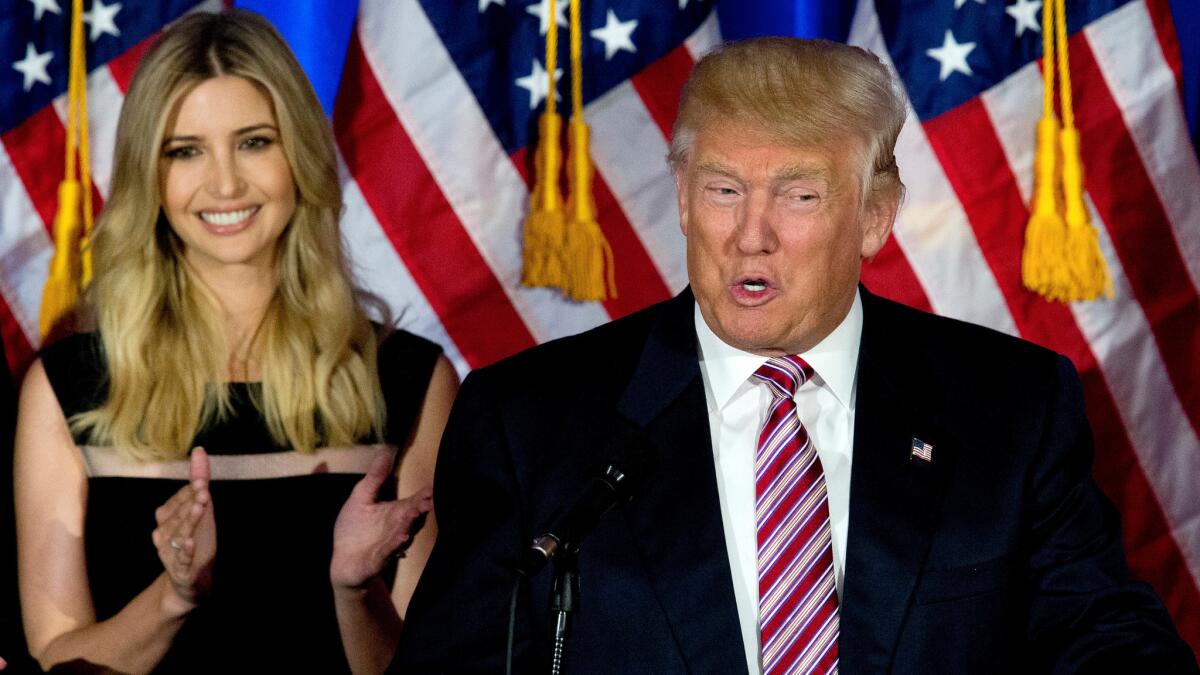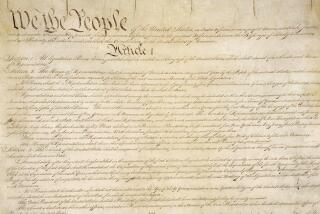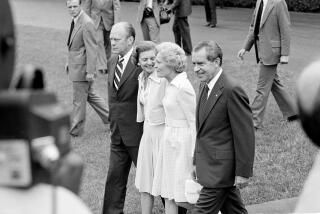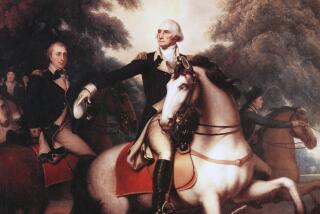Op-Ed: Presidential dads — how they behave at home says a lot about how they lead in the White House

There are three well known leadership styles — democratic, laissez-faire and autocratic. Leaders who are small-D democrats have the final say, but they involve others in the decision-making process. In contrast, laissez-faire leaders let subordinates take action, and autocratic leaders rarely consult others.
These categories obviously apply to the way American presidents have conducted the nation’s business. They also apply to way they have behaved as parents. For most presidents, who they are in the West Wing is pretty much who they are as family men.
I count some of our best-known presidents among the small-D democrats in leadership style: George Washington, James Monroe, Harry Truman, Gerald Ford and Barack Obama, for example.
The buck stopped with President Truman, but he also wanted to hear all sides of an issue. “Pooled brains on important subjects,” he said, were much better “than trying to have one head do the work.” As a father too he was anything but autocratic. In 1946, when first daughter Margaret Truman decided to become a singer after finishing college, her mother, Bess, pushed back. Truman heard them out, then sided with Margaret: “If she wants to be a warbler,” he wrote to his mother, “and has the talent and will to do the hard work necessary to accomplish her purpose, I don’t suppose I should kick.”
See the most-read stories this hour >>
The 20th president, James Garfield, was a GOP example of the democratic type. In his few months in office, before he was felled by an assassin’s bullet in 1881, Garfield stressed inclusion. Calling “the elevation of the Negro race from slavery to full rights of citizenship” the nation’s most important political change “since the adoption of the Constitution,” he sought to fight those who would deny blacks the right to vote.
At home, Garfield had similar instincts about enfranchisement. When he was a congressman, he supported President Rutherford B. Hayes’ many vetoes; Garfield even wanted to call the family dog Veto. But when Abram, then 8, the youngest of his five children, protested, he backtracked. “You are quite right,” Garfield told his son, “the whole family ought to be heard on the subject. … Each man, woman and child [will] have a vote.”
Trump often showcases [his kids] to make the case that his autocratic leadership style would prove inspiring rather than alienating to the rest of the nation.
Republican Ulysses S. Grant and Democrat Franklin Roosevelt both adhered to the laissez-faire style. Grant did not know how to set any limits with his four children. When his 13-year-old son Jesse wanted to withdraw from prep school, Grant immediately caved, sending a telegram, “Come home at once.” As his wife, Julia, put it, “The General had no idea of the government of children. He … allowed them to do pretty much as they pleased.” This penchant carried over to Grant’s administration; he proved incapable of disciplining aides who then embroiled him in ruinous scandals in his second term.
But laissez-faire leadership isn’t necessarily problematic. As a family disciplinarian, FDR was “the world’s worst,” his son Elliott later wrote. But Roosevelt’s 12 years in office were a stunning success because his capable deputies made good use of the latitude he gave them.
In contrast, John Adams and his eldest son, John Quincy Adams, were autocrats both at home and in the Oval Office. Our second president, who gave us the Alien and Sedition Acts in 1798, also often alienated his four children with his insistent demands. Adams expected them all to be “blessings both to their parents and to mankind.” Whenever they disappointed him, the critical dad let it rip. He even blasted them for sloppy penmanship. Likewise, our sixth president, whose fiery disposition led voters to reject his bid for reelection, did not hesitate to threaten eternal damnation whenever one of his sons fell behind in his studies at Harvard.
Join the conversation on Facebook >>
There are a few cases in which the family man and the president diverged in style. Dwight Eisenhower was an authoritarian dad. Of his father’s parenting, the twentysomething John explained to a reporter in the early 1940s, “When he told me to do something, I did it!” But as president, Eisenhower’s biographers agree he relied on consensus-building. He once said he counted the “power of persuasion” as “one of the fundamentals of democracy.”
As with Ike, Jimmy Carter’s military background also seeped into his parenting. Though as President Carter put a premium on peaceful negotiations — consider the Camp David Accords — as a father, the former naval officer insisted on taking charge. “I gave my three boys orders,” Carter admitted in 1996. “If they didn’t carry my orders out, they were punished.”
This year’s presidential contest appears to pit a democratic type against an autocrat. If elected, Hillary Clinton would be our first First Mom, and the record shows her to be a collaborative parent. When despite her best efforts Clinton couldn’t stop an infant Chelsea from crying, she blurted out, “This is new for both of us. … We are just going to have to do the best we can.” Her campaign slogan, “We are stronger together,” suggests she will try to relate to the American people in the same manner.
On the other hand, presumptive Republican nominee Donald Trump is used to giving orders. While Trump has managed to build cordial relationships with his three adult children from his first marriage — Donald Jr., Ivanka and Eric — who have all spent their entire careers working for the Trump Organization, he is clearly their boss. And despite Trump’s overbearing nature, these three kids are exceedingly loyal. As Eric told me, “I would take a bullet for my father.” Proud of his well-mannered children, Trump often showcases them to make the case that his autocratic leadership style would prove inspiring rather than alienating to the rest of the nation.
It is impossible to know in advance how effectively presidents will tackle the challenges of their times. What is predictable is the style in which they will do it. There are exceptions, but for the most part, what you see in the parent is what you get in the president.
Joshua Kendall is the author of the recently published “First Dads: Parenting and Politics From George Washington to Barack Obama.”
Follow the Opinion section on Twitter @latimesopinionand Facebook
MORE FROM OPINION
Even in the Wild West, there were rules about carrying concealed weapons
Climbing a ‘Stairway’ to the courthouse
More to Read
A cure for the common opinion
Get thought-provoking perspectives with our weekly newsletter.
You may occasionally receive promotional content from the Los Angeles Times.






